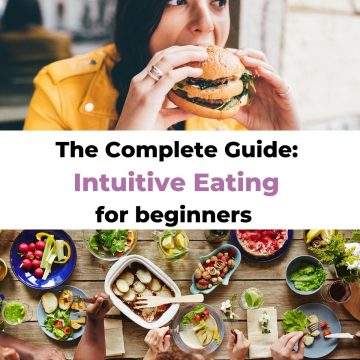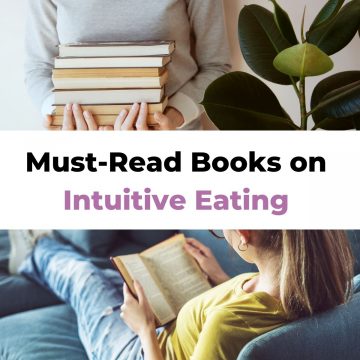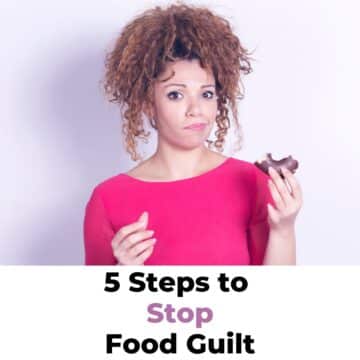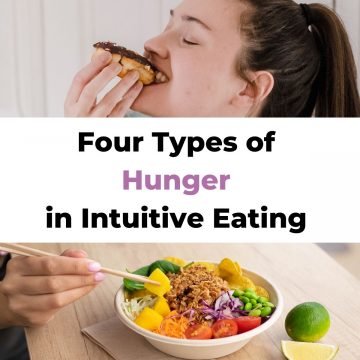Are you thinking about food all day, every day? If you’re constantly meal planning, tracking calories, talking about your diet, or feeling guilty after eating, you may be struggling with food obsession. While food is certainly an important part of each day, it shouldn’t consume your every thought.

Food is meant to be enjoyed, but feeling obsessed with food strips the pleasure out of eating, leaving meal times feeling stressful and rigid. If left unaddressed, this mindset can start to eat away at your personal, social, and work life, and that’s no way to live!
Keep reading to learn the signs of food obsession and how to stop these all-consuming thoughts about food, so you can redirect your mental energy to the things you value most.
What does it mean to be obsessed with food?
Being obsessed with food means you’re preoccupied with thoughts about food, eating, and dieting. It’s an obsessive and compulsive concern related to food that can appear in a number of ways. You might constantly plan out your meals in advance, feel shame about your food choices, or experience overwhelming cravings for specific foods.
An obsession with food is commonly linked to restrictive or disordered eating patterns. Eliminating certain foods, excessively counting calories, and skipping meals are all practices that can lead to feeling obsessed with food.
People who binge eat may feel completely out of control around food. Thanks to diet culture, they often believe this obsession with food is due to poor willpower, which results in feelings of guilt, shame, and inadequacy. However, overeating or binge eating has nothing to do with willpower and is likely the aftermath of restricting food.
If you’re obsessed with food, you could become stuck in the restrict-binge cycle. This dieting cycle is psychologically and physically harmful. A registered dietitian can help you learn how to start intuitive eating so you can break free from dieting for good.
Signs of food obsessions
Food obsession looks different from person to person. Let’s review a few of the more common signs of food obsession to give you a better idea of how this could seep into your daily life.
You’re preoccupied with thoughts about food
This could look like planning meals out for the day first thing in the morning, pre-logging all your food into a macro-tracking app, or beating yourself up for eating food on your “off-limits” list. You might be consumed with thoughts about grocery shopping, organic ingredients, specific food rules, or the latest fad diet.
You feel guilt and shame around food
If you’re still listening to the food police, that voice in your head telling you you’re “good” or “bad” for making certain food choices, you may feel guilt or shame after eating. Eating more than planned or indulging in “forbidden” food could leave you feeling like you failed, triggering obsessive thoughts about dieting.
You feel out of control around food
If you’re preoccupied with food, you might eat past the point of fullness or binge on food more frequently. Feeling out of control while eating and experiencing overwhelming cravings can make it nearly impossible to think about anything other than food.
You’re obsessed with weight and body image
Ditching the diet mentality and respecting your body takes practice. If you’re weighing yourself frequently, meticulously tracking your calorie intake, or convinced you’ll be able to squeeze back into your college jeans one day, your food obsession may be rooted in a desire to lose weight.
You avoid social gatherings involving food
When you’re embarrassed or ashamed of your eating habits, you may dodge social outings that involve food. Steering clear of dinners with friends, class reunions, and birthday parties because you’re afraid of breaking your diet is a sure sign your obsession with food needs to be addressed.
What causes food obsession?
There’s no single cause of food obsession. Being preoccupied with food is likely the result of several contributing factors. Let’s take a look at some here:
Restrictive diets
When your brain and body are energy deprived from dieting, it’s hard to think about anything other than food! Your body and brain need energy and will go out of their way to ensure you’ve got food on your mind.
Unfortunately, food restriction starts during childhood for many of us. One study showed that children whose parents restricted foods from them for health reasons were more likely to use food for comfort and eat more during times of stress.
Restrictive diets send your body into a protective mode to avoid starvation. Hunger hormones, such as neuropeptide Y and ghrelin, ramp up to increase appetite, while leptin, the hormone that indicates fullness, decreases.
Societal pressure
Diet culture is everywhere, constantly touting weight loss and the latest diet trends. These messages are ingrained in us from a young age. Family members, TV shows, radio commercials, and social media impact our thoughts about body image and healthy eating.
One study found that girls in 6-9th grade who reported societal pressure to be thin and a preoccupation with body image were at a greater risk of developing bulimia or binge eating disorder over a 3-year follow-up. In the same study, a perceived pressure to be thin was found to be the top eating disorder risk factor in women ages 13-21.
Unresolved trauma
There’s nothing wrong with using food to feel better now and then when it’s a conscious decision. However, emotional eating becomes problematic when it’s impulsive and your primary coping method when faced with difficult emotions. In this case, a food obsession may stem from trauma, depression, or unresolved past experiences.
What happens when food obsession goes too far?
An obsession with food can start innocently, such as measuring portion sizes to avoid feeling uncomfortably stuffed, but can quickly snowball into disordered eating patterns. Skipping meals, eliminating food groups, and following strict diet rules are signs of disordered eating that can lead to serious eating disorders.
Orthorexia
Although not an official diagnosis, orthorexia is an extreme fixation on eating healthy. It starts as an honest attempt to improve health, but escalates to a dangerous obsession. Someone with orthorexia strives to eat only the highest quality foods and ingredients to achieve optimal health. For example, they might only eat locally sourced whole, organic foods.
Anorexia
Anorexia is a serious eating disorder characterized by an intense fear of gaining weight, a distorted body image, and an ongoing restriction of food intake. People with anorexia commonly have an extreme obsession with food, calories, and diet. Low body weight can be a sign of anorexia, but people of all sizes can have this disorder.
Bulimia
Bulimia is often marked by binging and purging. Someone with bulimia is likely preoccupied with body weight. They may self-induce vomiting or misuse laxatives and weight loss products to avoid weight gain after binge eating. They could also engage in other compensatory behaviors like fasting or extreme exercise.
Binge-eating disorder
Similar to bulimia, people with binge eating disorder engage in binge eating, but they do not purge or fast after eating large quantities of food. People with this disorder eat when they are not hungry and struggle to recognize the difference between physical and emotional hunger.
Eating disorders can be life-threatening. Seek professional help from a mental health specialist and registered dietitian if you suspect that your obsession with food has turned into an eating disorder.
How to stop obsessing about food
Get to the core of WHY you’re obsessed with food! If you’re restricting food due to societal pressure and diet culture, it’s time to ditch the diet mentality for good. If you feel out of control around food, often eating large amounts of food very quickly, determine other coping methods to deal with challenging emotions.
I know, I know, easier said than done. Learning the 10 principles of intuitive eating is a good place to start when forming a healthier relationship with food. These principles take patience and practice, so give yourself grace when adapting to them. Here are some practical tips to help you get started.
- Stop restricting food. Nourish your body with the energy it needs by eating enough consistently throughout the day.
- Ditch the food rules. Give yourself unconditional permission to eat. No food is off-limits.
- Learn your hunger signals. Your body has the innate ability to communicate when it needs energy and when it’s had enough.
- Accept your body the way it is. Appreciate and respect all the ways your body serves you as it is right now.
- Establish healthy coping methods. Honor your health by engaging in gentle movement, journaling, or working with a licensed health professional to cope with difficult emotions.
Bottom Line
Being obsessed with food is mentally and emotionally exhausting. If you ruminate about future meals, skip social outings involving food, or feel guilty after indulging, it's time to redirect your energy away from food.
Whether your food obsession is rooted in diet culture, societal pressure, or unresolved trauma, there are steps you can take to break away from food thoughts so you can’t start truly living your life!
Did you find this post helpful? Try these next!





Leave a Reply